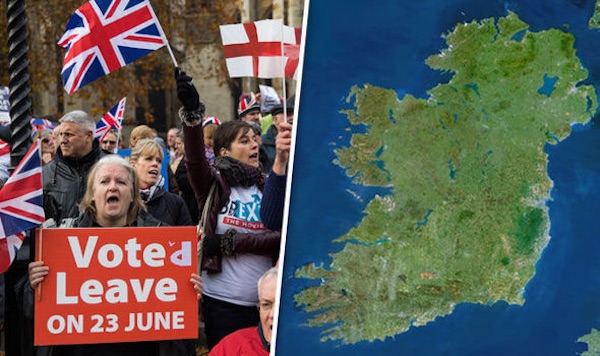
By Ben Kelly (for the Independent)
At last it’s becoming clear to the Brexiteers, and the right-wing British media, that the question of the Irish border will be the defining issue of the Brexit negotiations. Theresa May has long promised that the UK will be withdrawing from the single market and the customs union, while simultaneously promising no border on the island of Ireland. The simple fact is that she cannot keep both of these promises - something that the Republic of Ireland, the European Union, and large swathes of Remainers have long pointed out.
Now, as the Irish Taoiseach Leo Varadkar puts his foot down against the threat of a hard border on the island, the UK is flirting more with the prospect of moving that border into the Irish Sea - which is exactly where it should be.
Fifty-six per cent of voters in Northern Ireland, where I spent the first 19 years of my life, voted to Remain in the EU. Brexit was not the wish of the people there. Certainly this does not mean people would suddenly vote for a united Ireland just to stay in the EU, but the erosion of Northern Ireland’s place in the UK began long before 2016, and the Brexit vote is one of the final, potentially fatal blows to that union.
It was an act of political self-harm for the Democratic Unionist Party to support Brexit - an exercise in nostalgia and flag-waving they could not resist, which will now only serve to accelerate the reunification that republicans have fought for for decades.
Do not be deceived by the fact that the DUP is currently the kingmaker at Westminster. It is now entirely foreseeable that Theresa May will accept a hard border in the Irish Sea in order to achieve the dreams of English Brexiteers, even if it means Arlene Foster huffing and puffing and blowing the House of Commons down. If May has limped along thus far, she can surely get over the finish line without the wildly expensive DUP.
Back home, the DUP doesn’t have much to celebrate either. The resignation of Martin McGuinness in January reminded the party that it is beholden to its republican opponents in Belfast. Since then, Sinn Fein (who could soon enter coalition in the Republic of Ireland) has refused to re-enter the power-sharing Executive in Northern Ireland until equal rights are granted to all citizens, including LGBT people and Irish language speakers. Each day the DUP continues to reject this, it proves that the party is out of step with the general public, and shows younger generations that the puritan, sectarian backwater version of Northern Ireland to which the DUP wants to return is not fit for purpose.
The 2017 Northern Ireland Assembly election showed unionists had lost their majority in Northern Ireland for the first time ever. By the hundredth anniversary of the division of Ireland in 2021, it’s entirely plausible we will have overturned that catastrophe entirely.
For most of my life, while the notion of a united Ireland has been dreamt of by many - and worked hard towards by others - it has often been dismissed as a fantasy. Now in 2017, anything seems possible. Trumpers and Brexiteers were once dismissed too, right up until the point where their dreams became a stunning reality overnight. That moment is coming for Ireland, and it’s coming soon.
![[Irish Republican News]](https://republican-news.org/graphics/title_gifs/rn.gif)
![[Irish Republican News]](https://republican-news.org/graphics/title_gifs/harp.gif)

